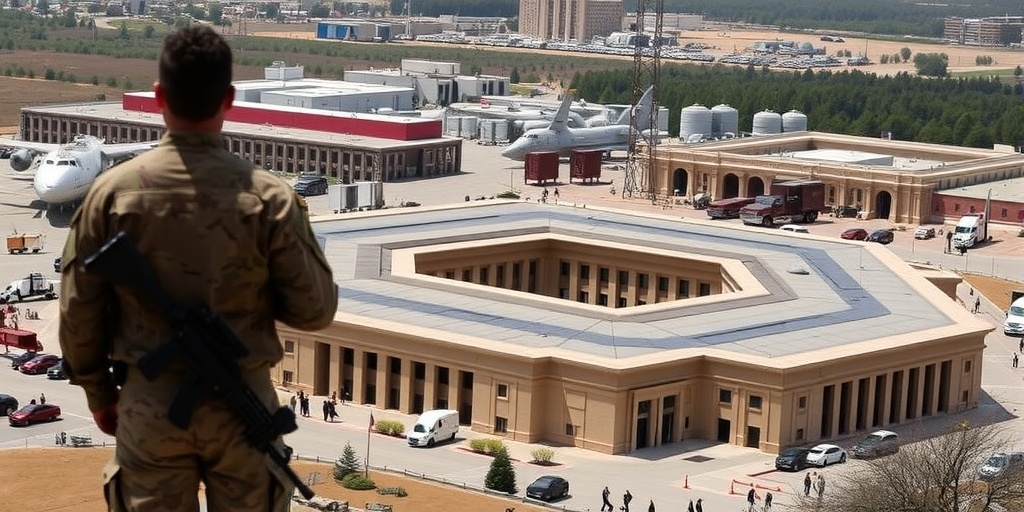Now Reading: Hegseth: Fort Moore to be Renamed Fort Benning
-
01
Hegseth: Fort Moore to be Renamed Fort Benning
Hegseth: Fort Moore to be Renamed Fort Benning

Defense Secretary Advocates for Re-Renaming Military Bases to Confederate Names
In a bold move that has sparked renewed debate, Defense Secretary Pete Hegseth announced on Monday a significant change in the naming conventions for military installations. His latest decision involves the reversion of Fort Moore back to its former name, Fort Benning, which previously honored Confederate General Henry Benning. This action is part of Hegseth’s ongoing campaign to restore the names of military bases that were altered to remove references to Confederate leaders as part of a broader bipartisan initiative.
Fort Moore, located in Georgia, had its name changed in 2023 during a concerted effort to eliminate military honorifics associated with Confederate figures, who led armies against the United States during the Civil War. Hegseth, however, argues that these modifications are symptomatic of a “woke” culture and seeks to reinstate traditional names that honor military heritage, regardless of their contentious history.
While current legislation prohibits the renaming of military bases after Confederate generals, Hegseth has cleverly circumvented these restrictions by proposing to honor soldiers with the same last names. Last month, he renamed Fort Liberty in North Carolina back to Fort Bragg—not in tribute to Braxton Bragg, the infamous Confederate general—but to honor Corporal Roland L. Bragg, a World War II veteran celebrated for his service.
On Monday, the focus shifted to Fort Moore, where Hegseth directed the Army to revert the base’s designation to Fort Benning in honor of Corporal Fred G. Benning, a soldier renowned for his bravery during World War I. Hegseth praised Corporal Benning’s “extraordinary heroism” on the battlefield in France during the Meuse-Argonne offensive, which took place in 1918. He emphasized how Benning embodied the ideals of an infantryman, committing to the mission and ensuring the safety of his comrades in the face of heavy combat.
Yet, this renaming comes at the cost of what Fort Moore represented following its dedication. The base was named in tribute to Lieutenant General Hal Moore, a distinguished Vietnam War hero, and his wife, Julie Compton Moore. The Moores significantly impacted military family support structures, prompting the Department of Defense to implement protocols that ensure families are promptly informed of military casualties—a practice still in place today.
General Hal Moore commanded troops during the battle of Ia Drang in 1965 and received numerous accolades for his bravery, including the Distinguished Service Cross and four Bronze Stars. His account of the Ia Drang battle is chronicled in the bestselling book “We Were Soldiers Once … and Young,” which was adapted into a film in 2002, featuring Mel Gibson as General Moore.
During the 2023 ceremony initially honoring the Moores, Major General Curtis Buzzard, in command of Fort Moore, articulated how the couple exemplified the best of both military service and the nation’s core values. He remarked on the importance of recognizing the sacrifices made by veterans, particularly those from the Vietnam War, while also acknowledging the critical roles played by Army spouses and families in the success of military operations.
The Moores are buried at Fort Moore, adding an emotional depth to the base’s previous tribute to their legacy. In response to Hegseth’s recent announcement, the couple’s son, Dave Moore, expressed sentiments that resonate with many service members and their families. He stated that his parents “still represent the values and culture and competencies” that Hegseth advocates for in the military, suggesting that preserving the name Fort Moore could be beneficial for the Department of Defense.
While Hegseth’s decision to rename Fort Moore to Fort Benning in honor of Corporal Benning introduces a complex dialogue about the legacies and memories within military naming practices, it underscores a larger divide in perceptions of military history and culture in contemporary America. His statement reiterates the call for the Army to seek ways to honor the Moores—a gesture that reveals the challenges of navigating a legacy intertwined with honor and controversy.
As the military grapples with how to honor its past while promoting inclusivity, the renaming of Fort Moore to Fort Benning serves as a reflection of ongoing cultural tensions and differing views on how best to commemorate servicemen and women who have shaped the nation’s military history. The decision raises questions about the interpretation of heritage and the values deemed worthy of remembrance in military institutions, ultimately revealing that the conversation about military names will continue to evoke strong responses and elicit fervent debate among service members, veterans, and the public alike.
Stay Informed With the Latest & Most Important News
Previous Post
Next Post
-
 01New technology breakthrough has everyone talking right now
01New technology breakthrough has everyone talking right now -
 02Unbelievable life hack everyone needs to try today
02Unbelievable life hack everyone needs to try today -
 03Fascinating discovery found buried deep beneath the ocean
03Fascinating discovery found buried deep beneath the ocean -
 04Man invents genius device that solves everyday problems
04Man invents genius device that solves everyday problems -
 05Shocking discovery that changes what we know forever
05Shocking discovery that changes what we know forever -
 06Internet goes wild over celebrity’s unexpected fashion choice
06Internet goes wild over celebrity’s unexpected fashion choice -
 07Rare animal sighting stuns scientists and wildlife lovers
07Rare animal sighting stuns scientists and wildlife lovers





















